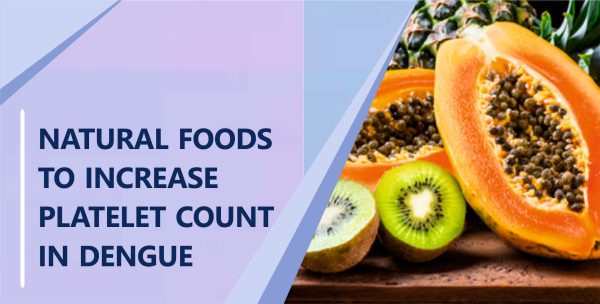Lifestyle
Best Foods to Increase Platelets in Dengue
Published
2 years agoon
By
Hamza Tahir
Platelets are the blood cells that aid in blood clotting to stop bleeding. By eating meals high in specific vitamins, a person may be able to naturally raise their platelet levels. Platelets can come down drastically when suffering from dengue fever. Here are Best Foods to Increase Platelets in Dengue for speedy recovery.
What is Dengue?
Dengue fever is a viral disease. It is caused by the bite of the infected female mosquito Aedes aegypti. This mosquito becomes infected when it takes the blood of a person infected with this virus. One should have best foods to increase Platelets in Dengue.
After approximately one week, it can transmit the virus to a healthy person via biting.
This fever is commonly known as “break-bone fever” because it causes severe joint pain. Headache, fever, and joint and muscle pain are the common symptoms of dengue. However, the alarming thing is the drop in the palate count. Therefore, a person can die if dengue fever is not treated on time.
Why Dengue Causes Decrease in Platelet Count?
Platelets are the blood cells that help in blood clotting when needed. They band together and adhere to one another to patch any damage to the lining of blood vessels.
A typical blood sample contains 1.5 to 4 lac platelets per microliter. A number less than 1.5 lac is called thrombocytopenia, and a number larger than 4 lac is called thrombocytosis.
When the normal level of platelets is decreased (thrombocytopenia), our body starts to show symptoms of easy bruising, bleeding gums, fatigue, etc.
In dengue fever, the level of platelets decreases in our bodies. The formation of the blood clot is decreased during dengue. Due to this, our blood becomes colorless. This condition can be life-threatening.
What Happens When Platelets are Low in Dengue?
Bone marrow is good for the production of platelets. Dengue fever suppresses the function of bone marrow. The level of the platelets is reduced when the bone marrow is suppressed.
This can lead to various health complications such as:
- Bleeding gums
- Nose bleeding
- Heavy menstrual bleeding
- Bleeding in stool and urine
- Rashes on the skin
Healthy food is your first and ultimate key to improving and increasing your platelet count naturally. If you feel overwhelmed by all this conflicting diet advice, then you’re not alone.
So, to help you out, Explore it beyond have prepared a list of foods to increase platelet count in dengue.
NOTE: You might be able to increase your platelet count with food and supplements if you have mild thrombocytopenia. But to prevent complications, you’ll probably require medical care if your platelet count is dangerously low.
ANOTHER THING TO KEEP IN MIND: Taking supplements or herbs to increase platelet count is not advised. Because the FDA doesn’t monitor supplements or herbs, their quality and purity aren’t controlled. Therefore, to be sure there are no drug or treatment approach interactions, always with your healthcare provider before taking them.
Now, without any further delay, let’s explain Foods to Increase Platelets in Dengue.
How to Increase Platelet Count in Dengue with Food?
Foods high in minerals and nutrients such as iron, folate, Vitamin C, and Vitamin B-12 can help your body improve and increase platelet count in the body.
Here’s a detailed view of how these foods help in increasing platelets count:
Vitamin C-rich foods: Vitamin C is essential for the production and survival of platelets, and it also helps improve their function. Good sources of vitamin C include citrus fruits (oranges, grapefruits, lemons), kiwi, strawberries, papaya, bell peppers, broccoli, and Brussels sprouts.
Iron-rich foods: Iron is necessary for the production of hemoglobin, a protein that carries oxygen in red blood cells. Low iron levels can lead to anemia, which may affect platelet counts as well. To boost your iron intake, consider eating lean meat, poultry, fish, beans, lentils, tofu, fortified cereals, nuts, and seeds.
Omega-3 fatty acid-rich foods: Omega-3s are healthy fats that can help reduce inflammation and improve blood flow, which may benefit platelet function. Sources of omega-3s include fatty fish (salmon, tuna, sardines), flaxseeds, chia seeds, walnuts, soybeans, and spinach.
Nowadays, all such nutrients are available in supplement form, but it’s good to get them naturally through food. Eating healthy is essential for regaining health.
However, increasing platelet count alone by food and exercise is fairly challenging. To restore normal platelet counts, certain illnesses like viral fever and dengue fever occasionally call for the intravenous administration of a platelet transfusion.
That so, the list of foods that increase platelets below might be somewhat helpful if you’re seeking a natural way to raise platelet levels.
1- Papaya and Papaya Leaves Extract – Best Food To Increase Platelet Count
If you are asking how to recover platelet count in Dengue, this is your answer. The top food on our list of remedies to increase platelets is, without a doubt, papaya. This whole fruit itself is a healer.
Consuming papaya or its leaves extract will help you naturally increase your platelet count fast within a few days. Researchers claim that papaya juice is highly beneficial for low platelet count.
How can you increase platelet count with papaya?
You can crush the papaya leaves and squeeze them to extract the juice. You can add the papaya leaves to the water and drink that solution. You can also add the papaya leaves to the tea.
All you need to do is:
- Simply take papaya, and add its leaves to the blender.
- Blend it properly and thoroughly. You’ll get a dark green color juice.
- Drink it to replenish your platelet count.
- The taste of papaya juice is very bitter. You can have sugar or anything sweet after drinking it to improve the taste in your mouth.
Papaya is possibly the best fruit to increase platelet count fast. This fruit is your answer to how to increase platelet count fast.
2- Pomegranate is the Best Food for Platelet Rich Diet
If you are looking for fresh fruits to increase platelets, pomegranate is one such fruit. The brilliant red color pomegranate is more than just a winter treat. Aside from being an excellent delicious winter fruit, it is good for your blood.
Not only is this fruit energy-boosting, but it also helps to maintain the normal level of blood platelet count. Anyone suffering from dengue should add pomegranate to their diet to replenish their energy.
Pomegranate also contains a lot of antioxidants and vitamin C, which can help strengthen immunity and effectively fight infections.
3- Green Leafy Vegetable: Low Platelet Count Treatment
Another food to increase platelet is vegetables. Green leafy vegetables such as broccoli and spinach are rich sources of Vitamin K, Iron, and omega- 3 fatty acids food.
Broccoli and spinach are a must in the diet of a person suffering from dengue. They are also rich in minerals and antioxidants beneficial for our bodies. Both of these veggies help boost our immune system as well.
How to increase platelets in dengue in 2 days?
Eating foods rich in vitamin B12, vitamin C, vitamin D, vitamin K, iron, and folate is good for increasing platelet count naturally.
4- Fresh Milk; A Complete Food to Increase Platelet
There is no hidden secret about the benefits of milk and how it helps our bone development and strengthening.
But, how many of you know that fresh milk is equally good for our blood regeneration? Yes, it’s true. Milk has vitamin K in it. Vitamin K is a basic essential element needed for proper blood clotting.
Additionally, routine milk drinking may increase total blood platelet counts. So, if you’re seeking dengue treatment foods to raise platelets naturally, make sure you drink milk frequently.
5- How to Increase Platelet Count in Dengue? Use Raisins
Here is the good news for raisin lovers. Raisins are delicious either way you eat them, whether just munching it simply, mixing it with rice, or sprinkling it over the yogurt.
Raisins are iron-rich, and they help strengthen our bodies.
Your body needs iron to create healthy blood cells. This makes raisins one of the good dengue treatment foods.
6- Lean Meats for Natural Platelet Increase
While some foods may not help you achieve a good platelet count, but, eating nutritious healthy food can improve your overall health.
Eating lean meat such as chicken, fish, and turkey is good when suffering from thrombocytopenia. They are rich in Vitamin B12, zinc, and protein which is helpful when looking for options on how to increase platelet count in dengue.
7- Coconut Water – A Healthy Platelet Boost
Another way to treat low blood platelet count in dengue is to consume coconut water.
Twice a day intake of coconut is good for having a healthy body. Coconut water is rich in healthy nutrients and electrolytes which is good and helpful in increasing the platelet count fast.
Are there any foods to avoid while having dengue?
While some items, including some drinks, can increase your platelet count, others can decrease it. Your platelet count may be lowered by the following foods:
- Quinine – present in tonic water
- Cranberry juice
- Aspartame – the artificial sweetener
- Alcohol
So, avoid the above-mentioned foods if you are in search of foods to increase platelet count in dengue.
When to Consult A Doctor?
Thrombocytopenia might result in serious problems if it is not appropriately treated. Immediately consult your physician if you see the following:
- Excessive bleeding
- Headaches from minor injuries
- Bleeding from the mouth or nose after brushing your teeth
- Simple bruises that worsen over time
These signs and symptoms point to a more severe case of thrombocytopenia that might require medical intervention.
Also, increasing platelet count alone is not enough, you always need to see the doctor.
Conclusion
Eating the aforementioned food to increase platelet is overall good for your health. These foods have an impressive nutritional profile. When there is a sharp decline in platelet count either in malaria or dengue fever, you should add these foods to the diet.
However, before making dietary changes it is best to consult a doctor because doing so may not be enough to restore platelet levels.
You may like
- Sharaqpur Ramadan Timing 2026 – Complete Sehri & Iftar Calendar (Fiqa Hanafi)
- Timergara Ramadan Timing 2026 – Complete Sehri & Iftar Schedule
- Turbat Ramadan Timing 2026 – Complete Sehri & Iftar Calendar (Fiqa Hanafi)
- Topi Ramadan Timing 2026 – Complete Sehri & Iftar Calendar (Fiqa Hanafi)
- Toba Tek Singh Ramadan Timing 2026 – Complete Sehri & Iftar Schedule





